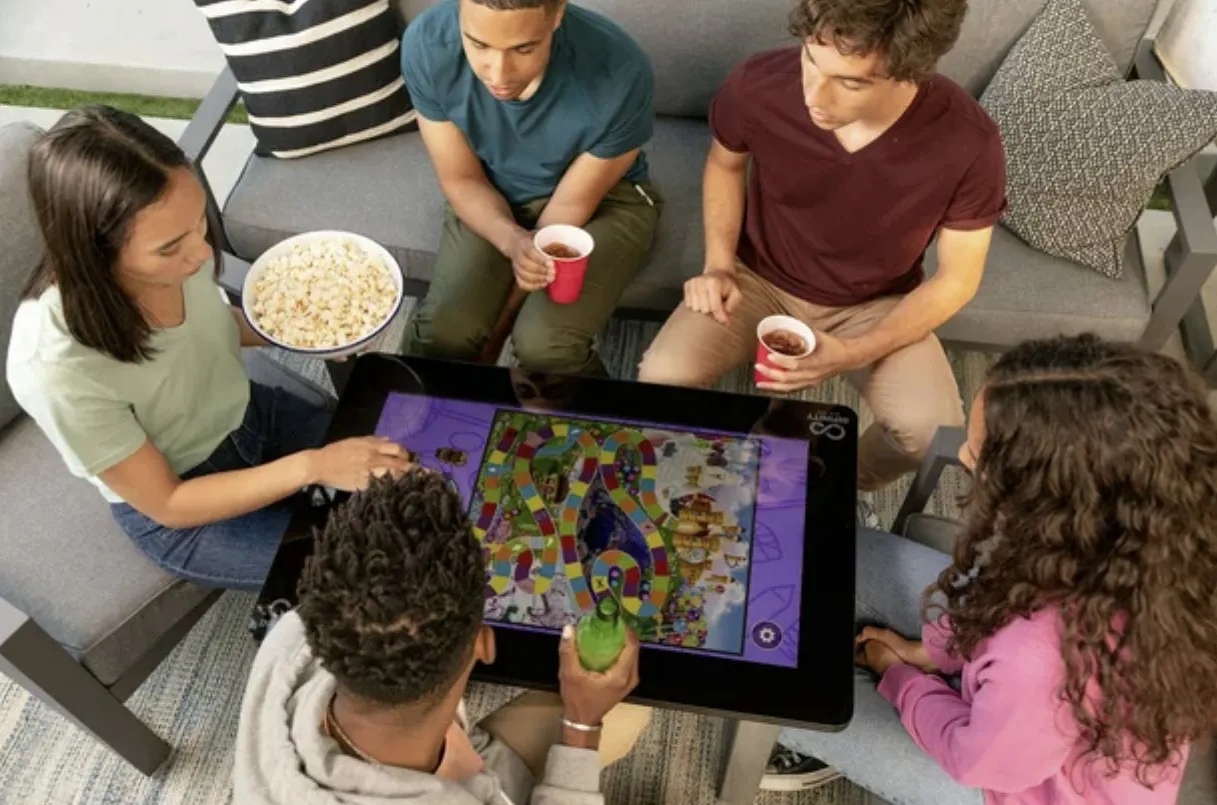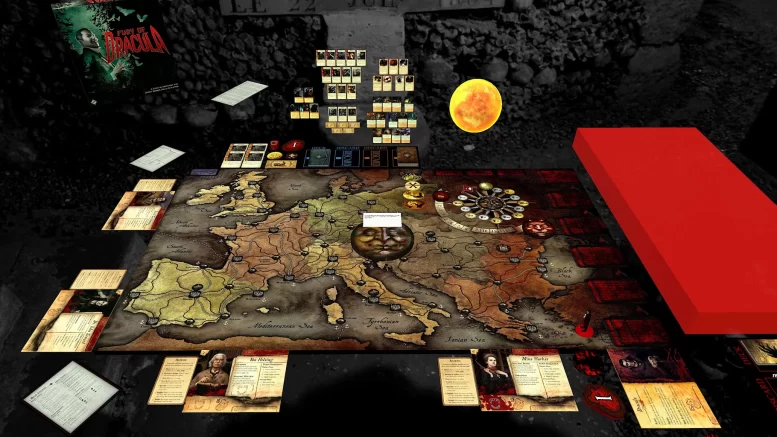Tabletop games are inherently physical, yet they’ve increasingly been going digital
The year is 2032, and the tabletop landscape is composed far more of ones and zeroes than cardboard and plastic. With the advancements in VR technology and virtual tabletop services, digital versions of games have officially overtaken physical games as the predominant method of play. Commercial AR and VR displays have become cheap enough to be a common site in many homes.
It has become expected to release digital versions of all physical games, with the occasional release going so far as to include a digital redemption code in a physical box. More and more games are being released thanks to the reduced costs of creating digital games, allowing for small studios to find success. All of this is due in no small part to practices and events over a decade in the making.
What is it about these digital alternatives that is so enticing to players? If you have sat around a table with some friends for a game night, you understand the draw and energy that can come from playing in person, but even the most die-hard in-person proponents would concede that playing in person has its drawbacks too, drawbacks that playing digitally does away with! First and foremost, gone is the annoyance of having to pack everything back up at the end of the day, and on the flip side setup can be far easier and quicker as well. Booting up a program or loading a mod is nicer than dealing with shuffling, board setup, and organization, and removes a lot of the hassle that can be a complete deal-breaker when wanting to play games in person.
The biggest benefit is the flexibility that comes with the digital options. Distance no longer becomes a barrier, and in some instances timing becomes a nonissue as well, as you can take your turn whenever you are able and play over a longer span of time as able. These options also make it simple to scratch that tabletop itch whenever you feel like it, if you simply want to play and don’t care who with. Play games with random strangers, try out your latest Magic deck against randos before surprising your pals with your latest devilish creation, or drop into a game of Secret Hitler at 2 a.m. because you can’t sleep.
The idea of using a program to re-create the feeling of playing tabletop games with your friends from afar is nothing new, even today in 2022. One of the earliest examples of a virtual tabletop was 2002’s MegaMek, an open-source fan-made option for players of the tactical wargame BattleTech that is still getting updates today. Since then, numerous other platforms have sprung up, including Steam’s Tabletop Simulator and Tabletop Playground and the browser-based Untap.in, Board Game Arena, and D&D Beyond. Much of the work that has elevated these services has come from small studios and communities of fans.
These services also got a boost when the COVID-19 pandemic hit and forced in-person play groups to either go without their hits of dice-rolling dopamine or go virtual. Many folks opted for the latter, with Tabletop Simulator seeing spikes of almost 150% in its player base in April 2020 over the previous month, according to Steam Charts, resulting in more than 7,000 new players at the digital tableside.
As we enter the end of 2022, game shop tournaments, in-person events, and local groups have begun again, yet many players remain content playing on their computers. Looking at the player counts in Tabletop Simulator today, as players’ lives began to regain some normalcy, the swell of users that the service saw during the start of the pandemic subsided and stabilized, but the numbers remain nearly double the average and peak user counts of those in December 2019, before the pandemic shutdowns. The fact that there has been retention shows that people have found value in this method of play. With such a jump in popularity, it isn’t hard to see that the big players in the tabletop world would take notice.
Many fan communities were in a good spot to jump into the digital space when shutdowns began, with established day one and tools and services. However, some of the bigger publishers and companies were caught unprepared for the sudden necessity of a digital option for their games. While Wizards of the Coast had an answer for Magic players during this time, it didn’t have an in-house option for Dungeons & Dragons players. The explosion in popularity of Dungeons & Dragons, and the increase in new users utilizing the services of D&D Beyond, made the prospect of bringing it under Wizards’ wing too alluring to pass up, and $146.3 million later, Wizards acquired the companion website.
The roadmap from August’s Wizards Presents event showed that this acquisition of D&D Beyond will be a linchpin in the digital and interconnected future Wizards has planned for Dungeons & Dragons and One D&D. Wizards has officially recognized that the future of the game is not set in the physical-only realm.
The recognition of the power and reach of the digital space doesn’t stop with Wizards. In 2021, Asmodee, one of the largest board game publishers (Catan, Ticket to Ride, Carcassonne) purchased the browser-based Board Game Arena. This brought some of the most popular board games of the recent era to an ever-expanding community of players.
Alongside all this, the development of these games is relying on the digital format more and more. “Gone are the days of printing prototypes over and over to test iterations,” says Nate Chatellier, a co-designer of the dice-battling board game Dice Throne. “Here at Dice Throne, we now have a large QA team on Discord, and we do 99% of our testing on Tabletop Simulator. It’s faster, cheaper, and more convenient.”
Some in the tabletop industry believe that the shift to digital will also expand and evolve the side of tabletop that focuses on re-creating games from large companies to release on digital platforms. “You will see even more digital adaptations and apps released alongside popular games, along with larger original IPs with wider product lines on a more regular release schedule,” says Breeze Grigas, designer and art director for mecha strategy board game AEGIS. “These products will more often be made in-house by larger teams that are paid full-time. I believe we will see more tabletop/digital hybrid companies like Dire Wolf by 2030.” Zephyr Workshop, the developer of AEGIS, has even created a free digital version of the first version of the game, which anyone that owns Tabletop Simulator can download. In some instances, the future is already here.

It may seem at first glance that the only paths that are being entertained are a digital future or a physical one, but there are some companies that are experimenting with a hybrid approach. One such option is Arcade1Up’s Infinity Game Table. More commonly known for its scaled-down retail arcade cabinets, Arcade1Up has melded your traditional family coffee table and tablet computer into one, allowing the family to gather around and play their favorite classics on the touch screen. Another option is Kickstarter success Teburu, the self-proclaimed first “smart” board game. This foldable piece of tech touts itself as doing the heavy lifting by taking care of things such as a game’s rules, enemy behavior and story events. It comes with lofty expectations, but with its RFID-enhanced minifigs, smart dice, and more, it may just deliver on them (along with its development kit for game designers and enthusiasts) when it arrives to backers in April 2023. It remains to be seen whether or not these hybrid approaches will gain traction among players, but having more options is always good.
When looking 10 or 20 years into the future, it remains to be seen how much of a place physical tabletop products will have, but perhaps looking at other forms of media that have digital offerings may provide some clues. Physical books have managed to survive through the inventions of radio, television, the internet, and, most recently, the e-reader, and are still printed. The music and movie industries both continue to print and sell physical CDs and Blu-rays of new releases, despite the dramatic shift in the past two decades to internet downloads and streaming services. If all of these physical mediums can withstand the test of time, who is to argue that tabletop won’t adapt and survive as well?
In the decade to come, if things remain on their current course, tabletop games will have a far more ingrained and deeper connection to the digital space. As our lives become busier, as days become more and more full of activities, or as the distance grows between groups of friends, knowing that there is a digital option to continue our long-running campaigns and sling spells in our favorite card games will be incredibly comforting. Seeing how the tabletop industry has continued to grow alongside AR and VR, these next 10 years present an exciting prospect. Yet despite all that, Chatellier says, “human beings will always need time to interact face to face. That is the magic that tabletop brings over digital gaming, and I don’t ever see that going away.”
Article plucked from:
https://www.polygon.com/23352511/digital-tabletop-games-coming-soon

Be the first to comment on "The future of tabletop games is digital"